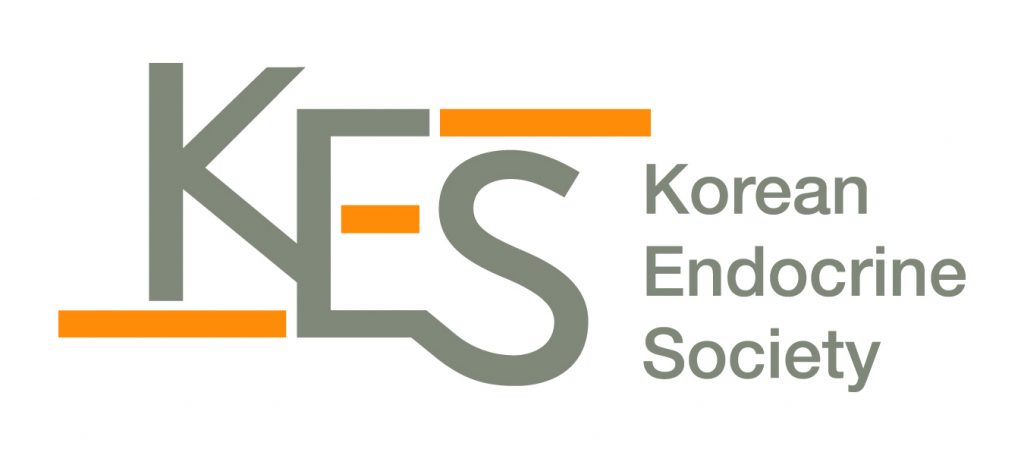
To commemorate the 40th anniversary of the Korean Endocrine Society (KES), Endocrine News is sharing a history of a vital sister organization to the Endocrine Society. First founded as a discussion group, the KES has grown into an internationally recognized endocrinology association that has impacted patient care and scientific research around the world.
The Korean Endocrine Society (KES) was founded in 1979 as the Endocrine Research Group and held its first monthly symposium in March. Simply a more formalized discussion group where endocrinology research was bandied about as more and more people in the medical community were becoming interested in endocrine disorders, most notably diabetes and obesity.
In 1982, it was formally known as the Korean Endocrine Society under the leadership of Professor Hunki Min as its first president and held its inaugural meeting at Seoul national University Hospital where this new integrated medical society was created, comprised of six chapters and 21 articles with a grand total of 37 members formally enrolled!
As it celebrates 40 years in 2022, the organization is a multidisciplinary academic society with 1,776 members (1,673 in Korea and 103 around the world). Under the leadership of current KES president, Professor Soon Jib Yoo of the Catholic University of Korea, Seoul, and chairman In-Joo Kim of Pusan National University, Busan, the KES’s goal is to continue to advance the practice of medicine through endocrine research.
The KES’s various activities are strikingly similar to the Endocrine Society’s — holding scientific sessions filled with relevant lectures; a robust publishing arm that includes a journal and textbooks; knowledge exchanges with both Korean and international academic institutions; guiding the career development of its members; continuing medical education for primary care physicians and residents; promoting awareness and education initiatives for the general public; and creating practice guidelines.
Since 2014, the KES has begun forming a memorandum of understanding (MOU) with endocrine societies around the world: the Chinese Society of Endocrinology in 2014; the Endocrine Society of the Republic of China in 2018; and the European Society of Endocrinology and the Endocrine Society, both in 2019. Building these relationships has been part of an ongoing effort to accelerate its globalization.
Endocrinology and Metabolism
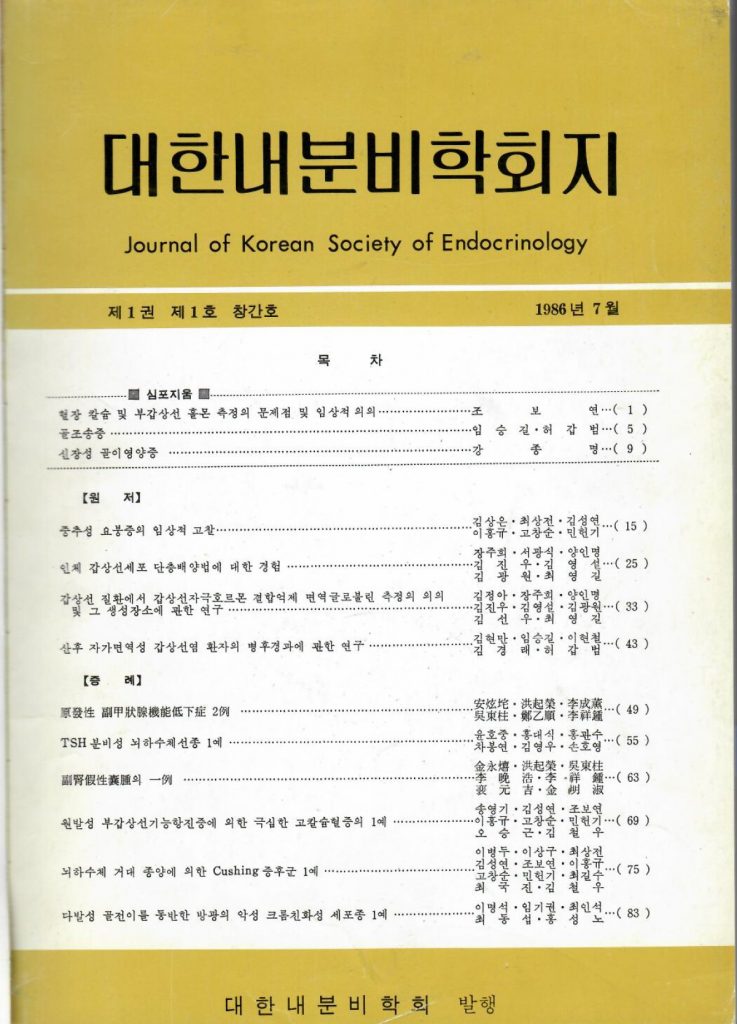
The official journal of the KES, Endocrinology and Metabolism (EnM), was first published in July 1986 as the Journal of the Korean Endocrine Society (left). By 1988, the journal was published twice a year; three times a year in 1989; in 1990 it became a quarterly; and beginning in 2000 it was published every other month. The KES established an online submission system in 2005 and the entire journal archives were then digitized for easy access for researchers around the world.
The renaming as EnM took place with the June 2010 issue, with each volume containing review articles, original articles, medical commentaries, and reader contributions on topics encompassing the entire, multifaceted field of endocrinology.
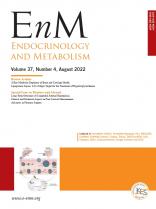
In 2013, the decision was made to convert EnM entirely to English so that it could easily gain a larger audience from endocrinologist around the world and be viewed as a robust, easily accessible international publication. EnM is an open access, peer-reviewed journal published a bimonthly and has been listed in PubMed since 2013, in Scopus since 2013, and in MEDLINE and Science Citation Index Expanded (SCIE) since 2019.
EnM is now widely recognized as an esteemed international academic journal in the field of endocrinology, with a Journal Impact Factor that reached 4.010 in 2020.
Seoul International Congress of Endocrinology and Metabolism (SICEM)
The KES has hosted a biannual academic conference since 1982 and began holding an international academic conference entitled the Seoul International Congress of Endocrinology and Metabolism (SICEM) in 2013, with a focus on representing researchers from Asian countries, welcoming up 1,500 participants from 30 countries.
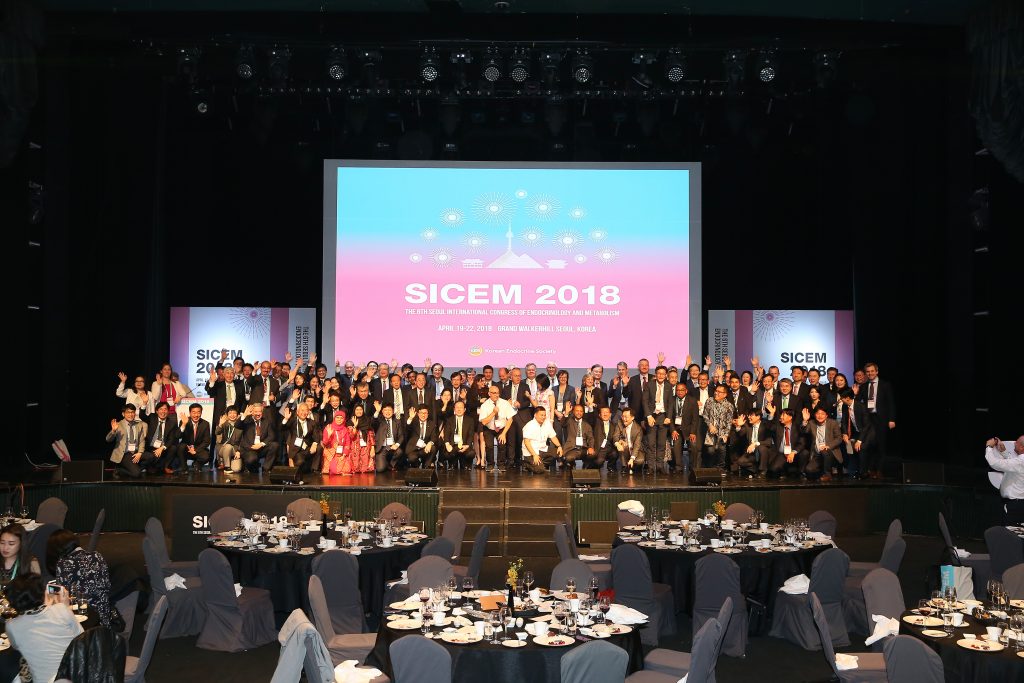
The KES’s spring-autumn biannual meetings have taken place since 1986, providing training workshops to medical doctors, trainees, and specialists since 1995. Although the KES is primarily a clinically focused organization, its annual symposium on science, education, and technology that covers topics in both basic science and clinical endocrinology have taken place in conjunction with its autumn meeting since 1997 to better stimulate dialogue and interactions between clinicians and basic scientists.
Since 2020, SICEM has been held in a hybrid format with both online and on-site events due to the COVID-19 pandemic. To improve its international network of researchers in endocrinology, SICEM continues to collaborate with academic associations from other countries. Its joint symposia with the Endocrine Society in the U.S., European Society of Endocrinology, Japan Endocrine Society, ASEAN Federation of Endocrine Societies, Carolinas Society of Endocrinologists, Tunisian Society of Endocrinology, Endocrine Society of the Republic of China (Taiwan), and the Endocrine Society of Australia are expanding steadily.
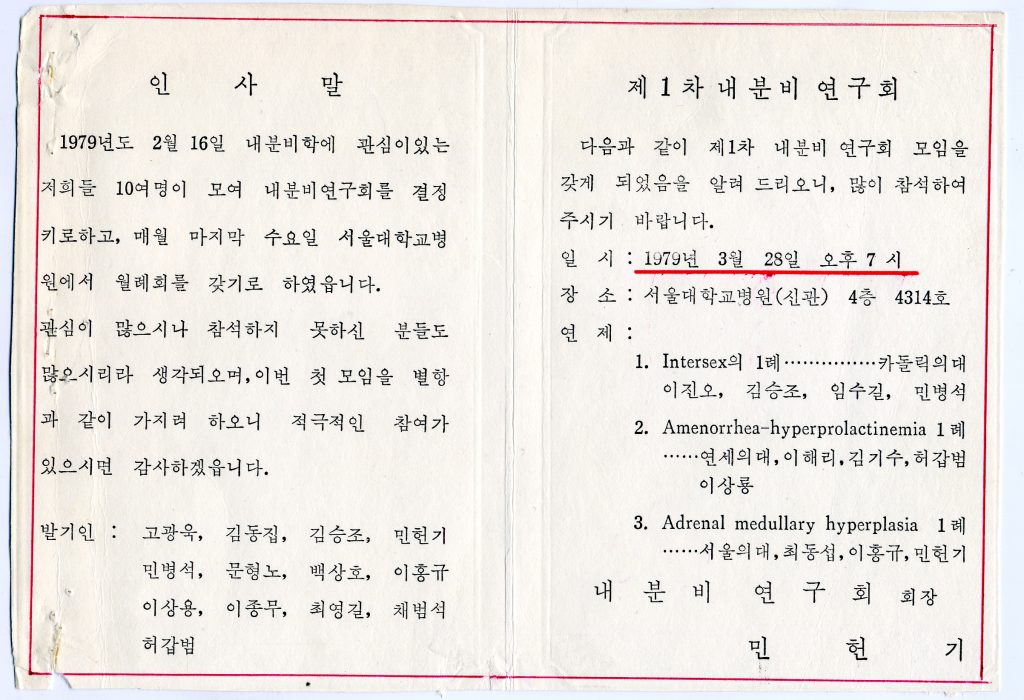
SICEM 2022 (www.sicem.kr) will take place in Gwangju, Korea, from October 27 to 29, with the theme “40 Years Together, New Leap Forward,” and Professors Joel Elmquist (University of Texas Southwestern Medical Center), George J. Kahaly (The Johannes Gutenberg University Medical Center, Germany), Hironobu Sasano (Tohoku University, Japan), and Hyun-Mo Ryoo (Seoul National University, School of Dentistry, Korea) will each give plenary lectures.
Supporting Future KES Leaders
To support outstanding researchers, especially those early in their careers, each year the KES presents various academic awards such as the Namgok Award, KES Research Award, Hyangseol Young Investigator Award, and the EnM Research Award. To date, a total of 1,478,000,000 Korean won (roughly $1.25 million) of research funding has been awarded. Specifically, the KES uses these awards to encourage young scientists actively engaged in research. Each year, KES members under the age of 40 who have excelled in the laboratory by exploring original and valuable research topics are selected as winners of the Hyangseol Young Investigator Award, which is accompanied by research funding.
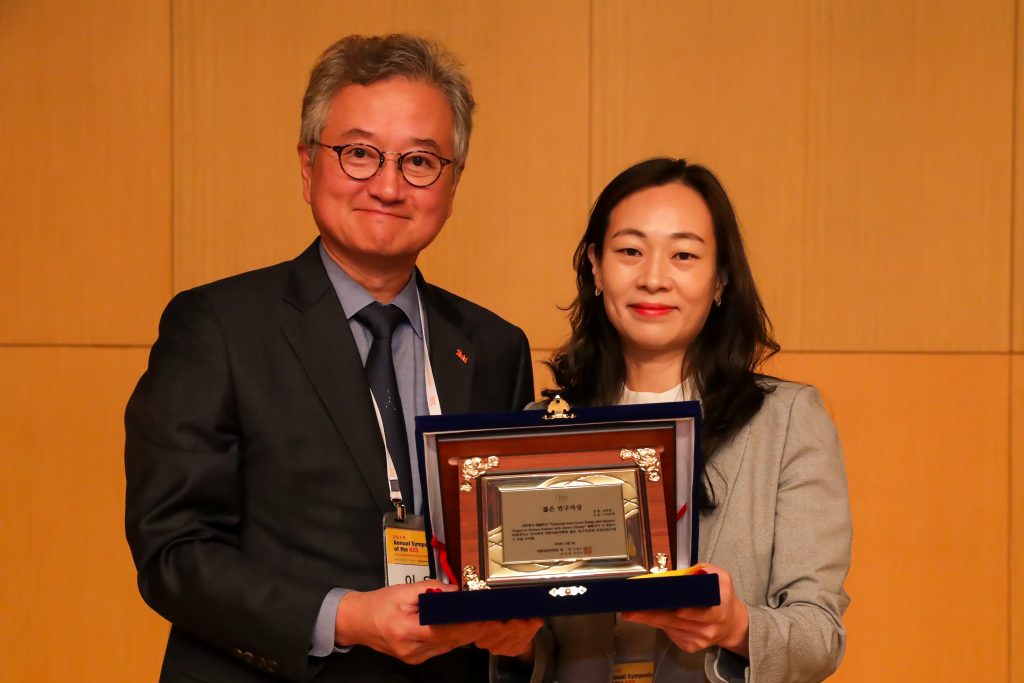
In 2021, Dr. Daham Kim of Yonsei University College of Medicine in Seoul, was awarded for his research entitled “Establishment of New Animal Model for Thyroid Ophthalmopathy and Development of Treatment Evaluation Platform.” Kim has published over 20 articles in renowned international journals, including The Journal of Clinical Endocrinology & Metabolism. In 2020, Dr. Hyon-Seung Yi of Chungnam National University College of Medicine in Daejeon, was awarded for his research, “Association Between Loss of Muscle Function and Immunophenotype or Metabolites of Peripheral Blood in Patients with Graves’ disease.”
In 2019, two researchers shared the award: Dr. Yea Eun Kang of Chungnam National University College of Medicine with “Identification of Anti-Cancer Drug Targets in Cancer Metabolism in Refractory Thyroid Cancer,” and Dr. Bu-Kyung Kim of Kosin University College of Medicine in Busan with “Trabecular Bone Score Change after Bariatric Surgery in Korean Patients with Severe Obesity.”
These award recipients are rising stars and future leaders of the KES. Since 2019, the KES has been sending young researchers to the Endocrine Society’s Global Leadership Academy that takes place each year at ENDO to foster future research leaders and build global leadership.
The Future of the KES
As it continually strives toward being a “world-level academic society of endocrinology,” the KES seeks to have a more global impact by forming MOUs, networking with academic societies around the world via various conferences, as well as developing EnM into a prestigious, internationally recognized journal that publishes research encompassing the full scope of endocrinology.
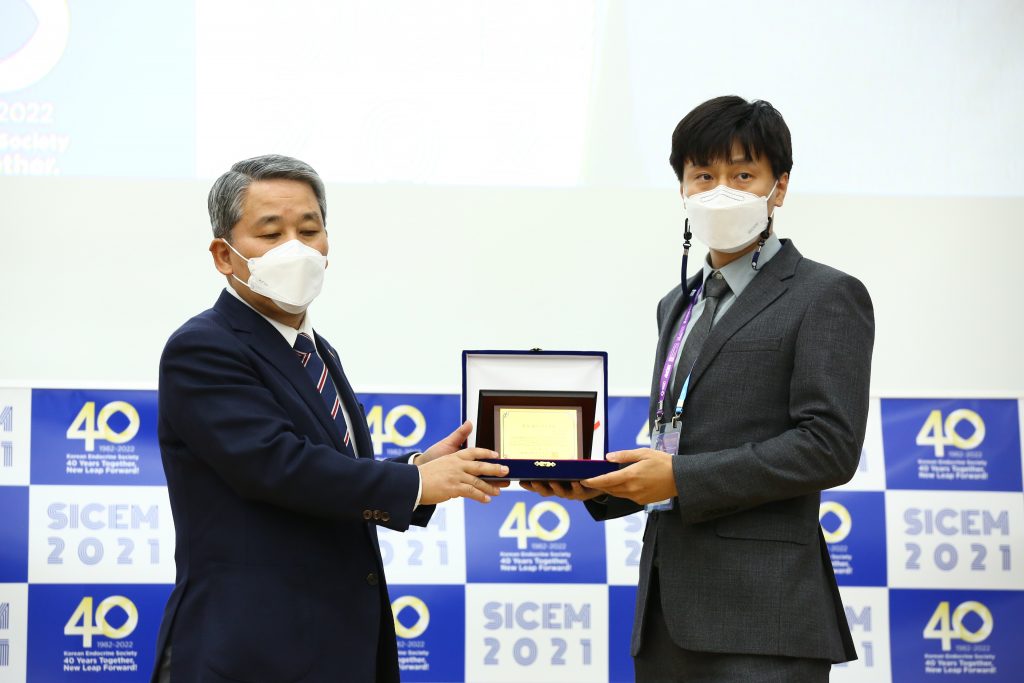
The KES strives to play a leading role in the field of endocrinology in the Asia-Pacific region by advocating for an evidence-centered medical system, strengthening its social role through the declaration of environment, social, and governance management, improving public communication through various channels, expanding public utility through its research group on rare diseases and endocrine-disrupting chemicals, and establishing the foundations of endocrinology for future generations.
If the past four decades are any indication, the KES will indeed be an important voice in the international endocrinology community for years to come.
Jeong is the secretary of the Korean Endocrine Society’s Committee of Public Relations.

